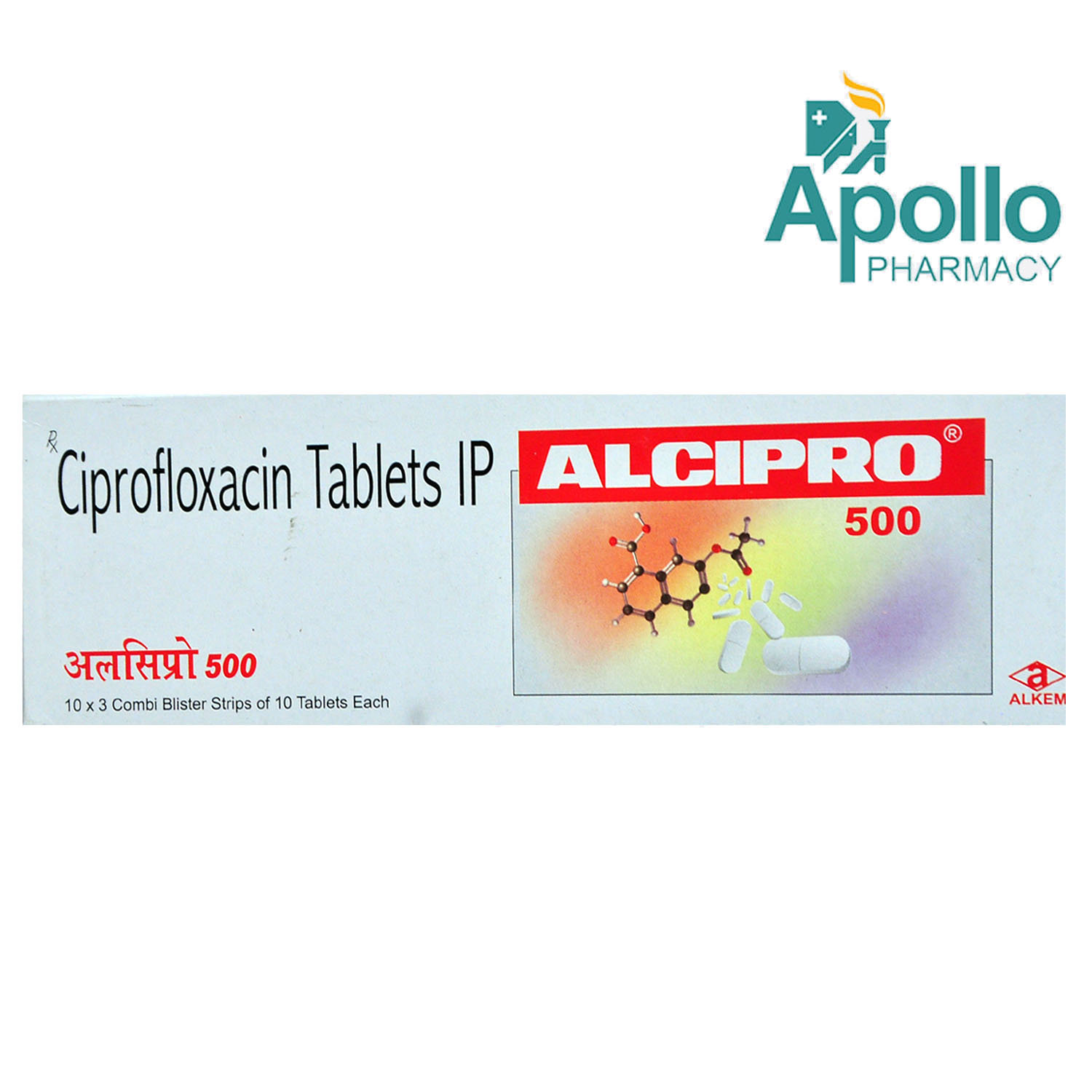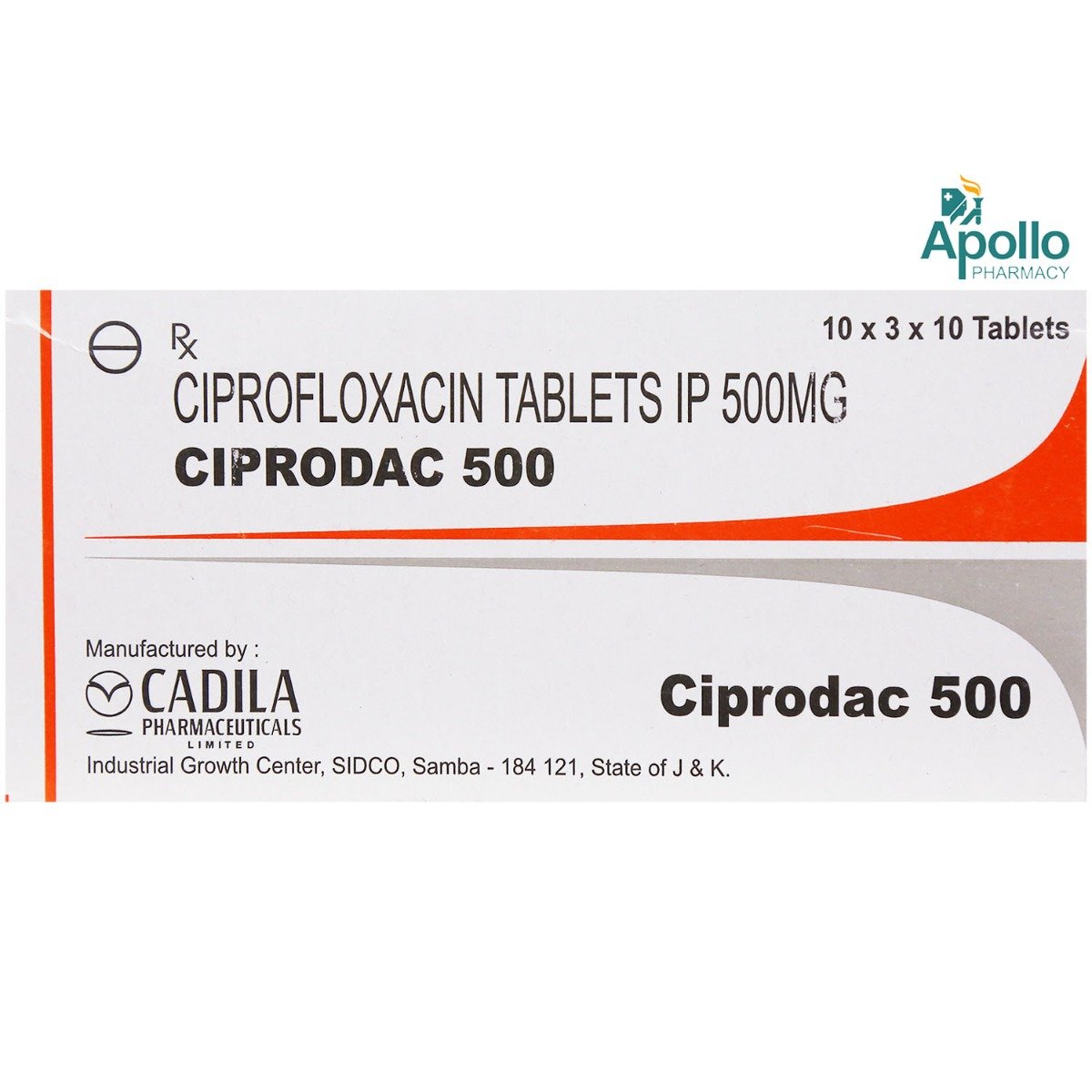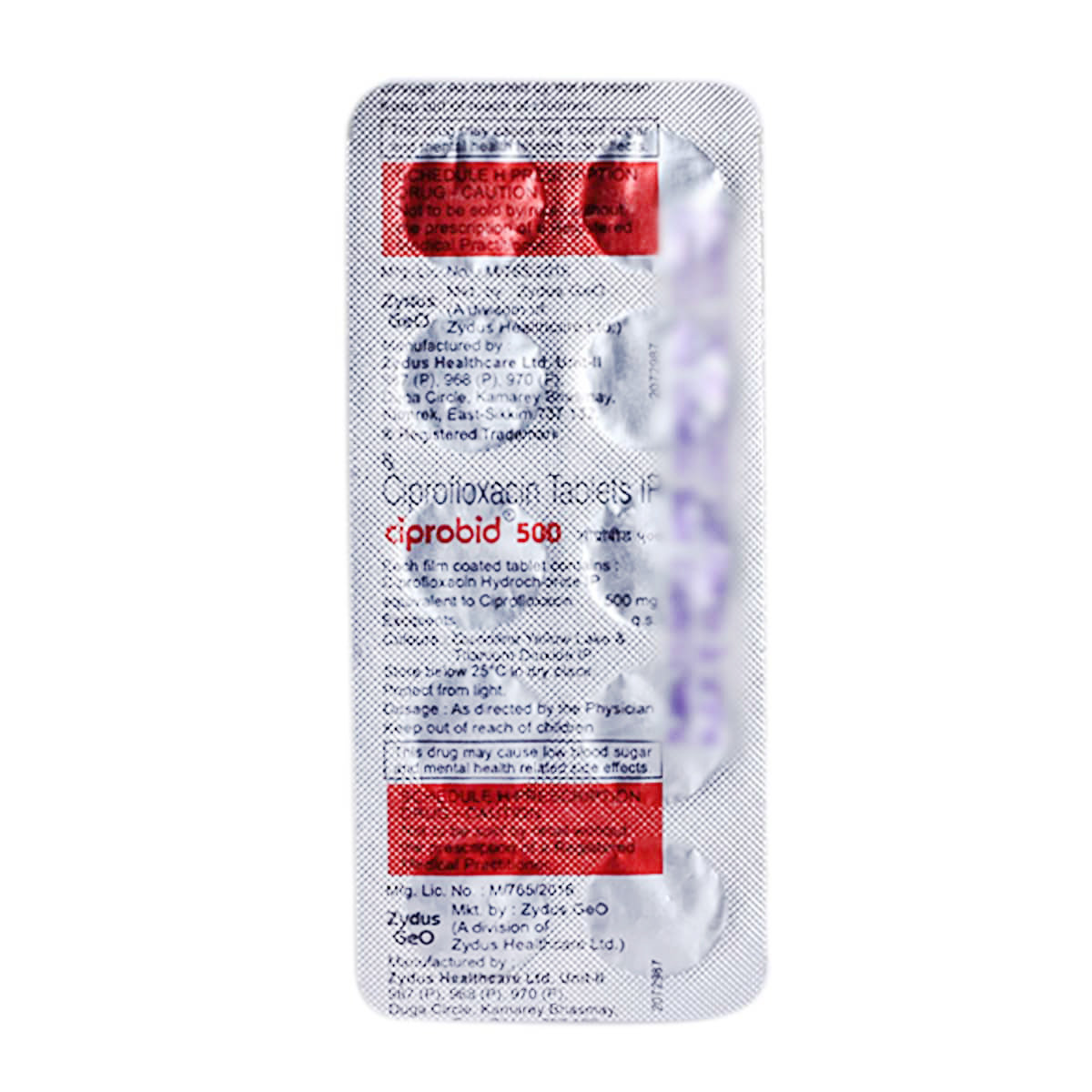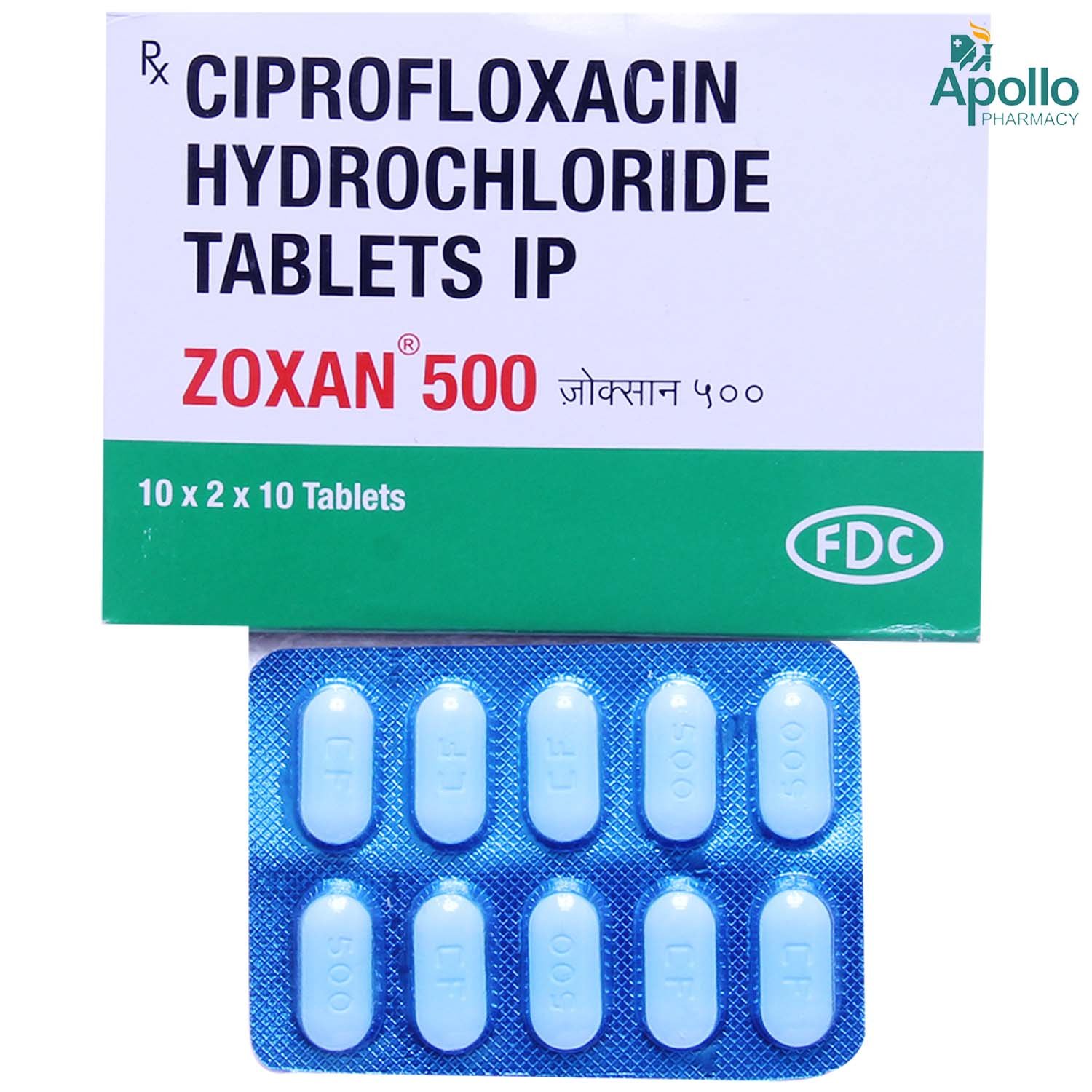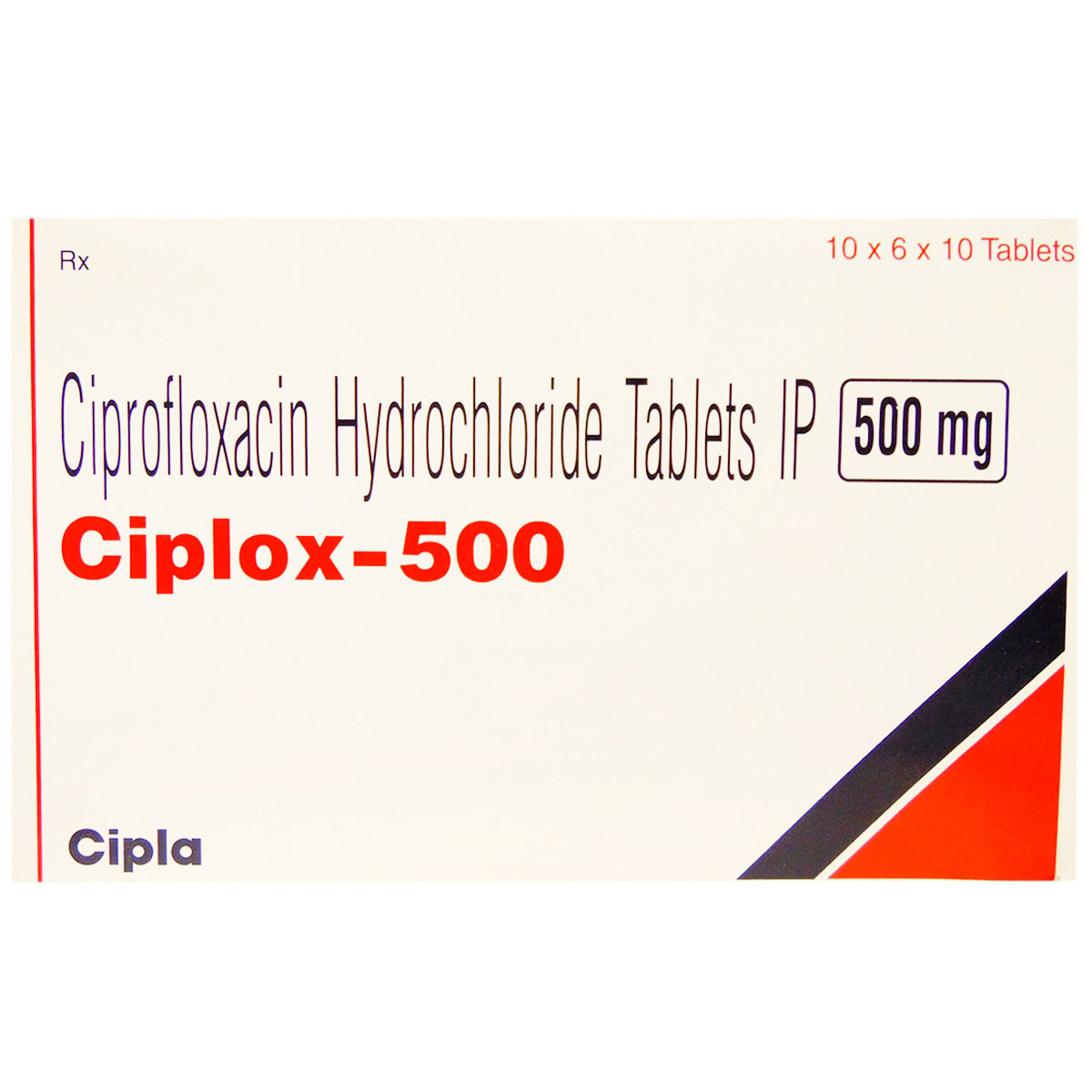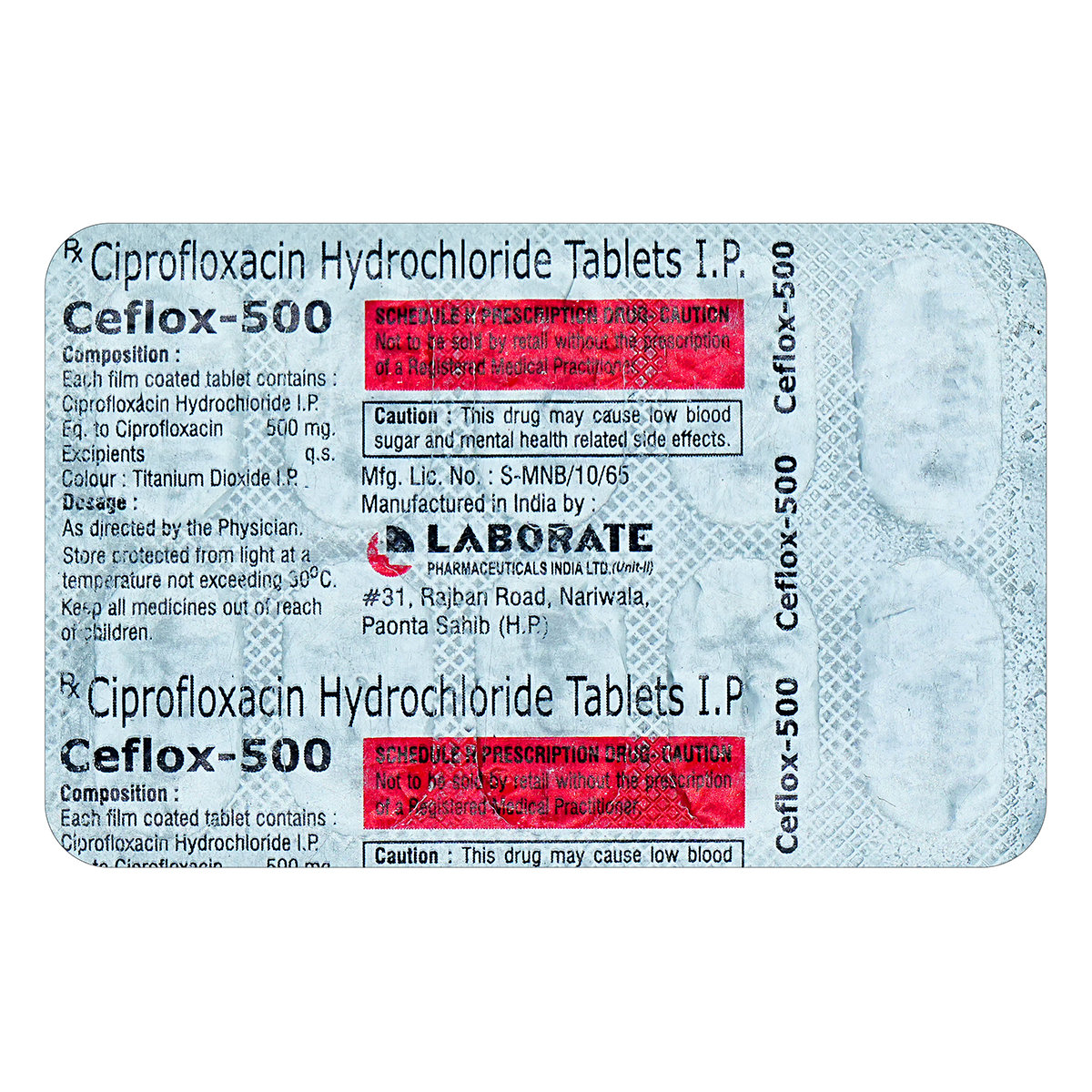AP Ciprochoice 500 mg Tablet 10's
MRP ₹60
(Inclusive of all Taxes)
₹9.0 Cashback (15%)
Provide Delivery Location
Online payment accepted
 Prescription drug
Prescription drugWhats That
Composition :
Manufacturer/Marketer :
Consume Type :
Expires on or after :
Return Policy :
NPPA :
About AP Ciprochoice 500 mg Tablet
AP Ciprochoice 500 mg Tablet contains the class of antibiotics known as fluoroquinolones, primarily used to treat or prevent certain infections caused by bacteria. It is prescribed for the treatment of pneumonia, gonorrhoea (a sexually transmitted disease), typhoid fever (a serious infection that is common in developing countries), infectious diarrhoea (infections that cause severe diarrhoea), and infections of the skin, bone, joint, abdomen (stomach area), and prostate (male reproductive gland).
AP Ciprochoice 500 mg Tablet contains an antibiotic 'Ciprofloxacin' which is bactericidal in nature and works by killing bacteria that cause infections. It prevents the division of bacterial cells. It also inhibits the repair of bacterial cells. Altogether it kills the bacteria.
AP Ciprochoice 500 mg Tablet should be taken in the dose and duration as advised by your doctor. In some cases, you may experience nausea, diarrhoea, liver function tests abnormal, vomiting, and rash. Most of these side effects of AP Ciprochoice 500 mg Tablet do not require medical attention and gradually resolve over time. However, if the side effects are persistent, reach out to your doctor.
It is not advisable to stop this medicine suddenly to avoid unpleasant side effects. Inform your doctor if you have any lung disease, muscle weakness (myasthenia gravis), sleeping disorder or difficulty in sleeping (sleep apnoea), severe liver disease, or problem with alcohol or other prescription recreational drugs. Inform your doctor if you are planning to get pregnant, are pregnant or breastfeeding. If you experience any symptoms of an allergic reaction such as rashes, itching, swelling, shortness of breath, etc. you should contact a doctor immediately.
Uses of AP Ciprochoice 500 mg Tablet
Directions for Use
Key Benefits
AP Ciprochoice 500 mg Tablet contains the antibiotic Ciprofloxacin, which helps treat and prevent a wide range of bacterial infections. It is bactericidal in nature and works by killing bacteria that cause infections. It prevents the division of bacterial cells and inhibits the repair of bacterial cells. Both these actions lead to the killing of the bacteria.
Storage
- Inform your doctor about the nausea and discuss possible alternatives to the medication or adjustments to the dosage.
- Divide your daily food intake into smaller, more frequent meals to reduce nausea.
- Opt for bland, easily digestible foods like crackers, toast, plain rice, bananas, and applesauce.
- Avoid certain foods that can trigger nausea, such as fatty, greasy, spicy, and smelly foods.
- Drink plenty of fluids, such as water, clear broth, or electrolyte-rich beverages like coconut water or sports drinks.
- Use ginger (tea, ale, or candies) to help relieve nausea.
- Get adequate rest and also avoid strenuous activities that can worsen nausea.
- Talk to your doctor about taking anti-nausea medication if your nausea is severe.
- Record when your nausea occurs, what triggers it, and what provides relief to help you identify patterns and manage your symptoms more effectively.
- Inform Your Doctor: Notify your doctor immediately about your diarrhoea symptoms. This allows them to adjust your medication or provide guidance on managing side effects.
- Stay Hydrated: Drink plenty of fluids to replace lost water and electrolytes. Choose water, clear broth, and electrolyte-rich drinks. Avoid carbonated or caffeinated beverages to effectively rehydrate your body.
- Follow a Bland Diet: Eat easy-to-digest foods to help firm up your stool and settle your stomach. Try incorporating bananas, rice, applesauce, toast, plain crackers, and boiled vegetables into your diet.
- Avoid Trigger Foods: Steer clear of foods that can worsen diarrhoea, such as spicy, fatty, or greasy foods, high-fibre foods, and dairy products (especially if you're lactose intolerant).
- Practice Good Hygiene: Maintain good hygiene to prevent the spread of infection. To stay healthy, wash your hands frequently, clean and disinfect surfaces regularly, and avoid exchanging personal belongings with others.
- Take Anti-Diarrheal Medications: If your doctor advises, anti-diarrheal medications such as loperamide might help manage diarrhoea symptoms. Always follow your doctor's directions.
- Keep track of your diarrhoea symptoms. If they don't get better or worse or are accompanied by severe stomach pain, blood, or dehydration signs (like extreme thirst or dark urine), seek medical help.
- Preventing Vomiting (Before it Happens)
- Take medication exactly as prescribed by your doctor. This can help minimize side effects, including vomiting.
- Having a small meal before taking your medication can help reduce nausea and vomiting.
- Talk to your doctor about taking anti-nausea medication along with your prescribed medication.
- Managing Vomiting (If it Happens)
- Try taking ginger in the form of tea, ale, or candy to help alleviate nausea and vomiting.
- What to Do if Vomiting Persists
- Consult your doctor if vomiting continues or worsens, consult the doctor for guidance on adjusting your medication or additional treatment.
- Take medications with food (if recommended): It can help prevent stomach distress and indigestion.
- Eat smaller, more frequent meals: Divide daily food intake into smaller, more frequent meals to ease digestion.
- Avoid trigger foods: Identify and avoid foods that trigger indigestion, such as spicy, fatty, or acidic foods.
- Stay upright after eating: Sit or stand upright for at least 1-2 hours after eating to prevent stomach acid from flowing into the oesophagus.
- Avoid carbonated drinks: Avoid drinking carbonated beverages, such as soda or beer, which can worsen indigestion.
- Manage stress: To alleviate indigestion, engage in stress-reducing activities like deep breathing exercises or meditation.
- Consult a doctor if needed: If indigestion worsens or persists, consult a healthcare professional to adjust the medication regimen or explore alternative treatments.
- Skin rash caused by allergies is due to irritants or allergens. Therefore, avoid contact with such irritants.
- Consult your doctor for proper medication and apply an anti-itch medication. Follow the schedule and use the medication whenever needed.
- Protect your skin from extreme heat and try to apply wet compresses.
- Soak in the cool bath, which gives a soothing impact to the affected area.
- If you have symptoms such as pain, swelling, redness, or warmth in your veins after taking medication, contact your doctor right once. Share information about your symptoms, medication regimen, and medical history.
- Your doctor will then assess your medication regimen to determine if it's contributing to the thrombophlebitis. This assessment will help identify the best course of action to manage your condition and prevent further complications.
- Your doctor may suggest certain diet and lifestyle changes to help manage your condition. This may include increasing your intake of foods rich in omega-3 fatty acids, staying hydrated, exercising regularly, and maintaining a healthy weight. Your doctor may also advise medications to reduce inflammation, prevent blood clots, or manage pain if necessary.
- If your condition does not improve or persists, consult your doctor and report your condition. Your doctor will assess your progress, adjust your treatment plan if necessary, and provide appropriate advice to ensure the best possible outcome.
- If you have symptoms such as pain, swelling, redness, or warmth in your veins after taking medication, contact your doctor right once. Share information about your symptoms, medication regimen, and medical history.
- Your doctor will then assess your medication regimen to determine if it's contributing to the thrombophlebitis. This assessment will help identify the best course of action to manage your condition and prevent further complications.
- Your doctor may suggest certain diet and lifestyle changes to help manage your condition. This may include increasing your intake of foods rich in omega-3 fatty acids, staying hydrated, exercising regularly, and maintaining a healthy weight. Your doctor may also advise medications to reduce inflammation, prevent blood clots, or manage pain if necessary.
- If your condition does not improve or persists, consult your doctor and report your condition. Your doctor will assess your progress, adjust your treatment plan if necessary, and provide appropriate advice to ensure the best possible outcome.
Drug Warnings
Do not take AP Ciprochoice 500 mg Tablet if you are allergic or have had a severe reaction to ciprofloxacin or any other quinolone or fluoroquinolone antibiotic such as delafloxacin gemifloxacin, levofloxacin, moxifloxacin and ofloxacin. Taking AP Ciprochoice 500 mg Tablet may increase the chances of developing tendinitis (swelling of a fibrous tissue that connects a bone to a muscle) or have a tendon rupture (tearing of a fibrous tissue that connects a bone to a muscle). Inform your doctor if you have or have ever had a kidney, heart, or lung transplant, kidney disease, a joint or tendon disorder such as rheumatoid arthritis (auto immune disorder of joints causing pain, swelling, and loss of function), seizures (fits), epilepsy or if you participate in regular physical activity. Taking AP Ciprochoice 500 mg Tablet may worsen muscle weakness in people with myasthenia gravis (a disorder of the nervous system that causes muscle weakness) and cause severe difficulty breathing or death. Dairy products should be avoided along with AP Ciprochoice 500 mg Tablet . And also, exposure to sunlight should be avoided while taking AP Ciprochoice 500 mg Tablet as it may cause increased phototoxicity or photosensitivity. Patients with epilepsy, and irregular heartbeat (especially a condition known as QT prolongation) should tell their doctor before taking AP Ciprochoice 500 mg Tablet .
Drug-Drug Interactions
Drug-Drug Interactions
Login/Sign Up
When Dronedarone is taken with AP Ciprochoice 500 mg Tablet, it can increase the chance of a serious abnormal heart rhythm. If you suffer from any cardiac conditions, or electrolyte disturbances (such as magnesium or potassium deficiency brought on by severe or prolonged diarrhea or vomiting), you may be at higher risk.
How to manage the interaction:
Taking AP Ciprochoice 500 mg Tablet with Dronedarone is not recommended, it can be taken if prescribed by the doctor. However, if you experience sudden dizziness, lightheadedness, fainting, breathing difficulty, or rapid heartbeat, consult the doctor immediately. Do not stop any medications without a doctor's advice.
When AP Ciprochoice 500 mg Tablet is taken with Quinidine, it can increase the chance of a serious abnormal heart rhythm.
How to manage the interaction:
Taking AP Ciprochoice 500 mg Tablet with Quinidine is not recommended, it can be taken if prescribed by the doctor. However, if you experience sudden dizziness, lightheadedness, fainting, breathing difficulty, or rapid heartbeat, consult the doctor immediately. Do not stop any medications without a doctor's advice.
When Flibanserin is taken with AP Ciprochoice 500 mg Tablet, it can cause extreme drowsiness and reduces blood pressure that can lead to dizziness, lightheadedness, fainting.
How to manage the interaction:
Taking AP Ciprochoice 500 mg Tablet with Flibanserin is not recommended, but it can be taken if prescribed by the doctor. It is advised to take flibanserin at bedtime to reduce the risk of side effects
When AP Ciprochoice 500 mg Tablet is taken with Pimozide, it can increase the chance of a serious abnormal heart rhythm. If you suffer from any cardiac conditions, or electrolyte disturbances (such as magnesium or potassium deficiency brought on by severe or prolonged diarrhea or vomiting), you may be at higher risk.
How to manage the interaction:
Taking AP Ciprochoice 500 mg Tablet with Pimozide is not recommended, it can be taken if prescribed by the doctor. However, if you experience sudden dizziness, lightheadedness, fainting, breathing difficulty, or rapid heartbeat, consult the doctor immediately. Do not stop any medications without a doctor's advice.
Combining AP Ciprochoice 500 mg Tablet with Thioridazine can increase the chance of a serious abnormal heart rhythm. If you suffer from any cardiac conditions, or electrolyte disturbances (such as magnesium or potassium deficiency brought on by severe or prolonged diarrhea or vomiting), you may be at higher risk.
How to manage the interaction:
Taking AP Ciprochoice 500 mg Tablet with Thioridazine is not recommended, it can be taken if prescribed by the doctor. However, if you experience sudden dizziness, lightheadedness, fainting, breathing difficulty, or rapid heartbeat, consult the doctor immediately. Do not stop any medications without a doctor's advice.
Coadministration of sotalol together with AP Ciprochoice 500 mg Tablet can increase the risk or severity of irregular heart rhythm.
How to manage the interaction:
Taking Sotalol with AP Ciprochoice 500 mg Tablet is generally avoided as it can result in an interaction, it can be taken together if prescribed by a doctor. However, consult the doctor if you experience sudden dizziness, lightheadedness, fainting, breathing difficulty. Do not discontinue any medications without consulting a doctor.
Using AP Ciprochoice 500 mg Tablet with Procainamide can increase the chance of a serious abnormal heart rhythm.
How to manage the interaction:
Taking AP Ciprochoice 500 mg Tablet with Procainamide is not recommended, it can be taken if prescribed by the doctor. However, if you experience sudden dizziness, lightheadedness, fainting, breathing difficulty, or rapid heartbeat, consult the doctor immediately. Do not stop any medications without a doctor's advice.
Using AP Ciprochoice 500 mg Tablet with Cisapride can increase the chance of a serious abnormal heart rhythm. If you suffer from any cardiac conditions, or electrolyte disturbances (such as magnesium or potassium deficiency brought on by severe or prolonged diarrhea or vomiting), you may be at higher risk.
How to manage the interaction:
Taking AP Ciprochoice 500 mg Tablet with Cisapride is not recommended, it can be take if prescribed by the doctor. However, if you experience sudden dizziness, lightheadedness, fainting, breathing difficulty, or rapid heartbeat, consult the doctor immediately. Do not stop any medications without a doctor's advice.
Coadministration of AP Ciprochoice 500 mg Tablet and Tizanidine together can increase the risk of side effects.
How to manage the interaction:
Using AP Ciprochoice 500 mg Tablet and Tizanidine together is avoided, as it can result in an interaction, it can be taken if your doctor has advised it. However, if you experience drowsiness, weakness, sweating, or palpitations contact the doctor immediately. Do not discontinue any medications without consulting the doctor.
Taking Amiodarone and AP Ciprochoice 500 mg Tablet may significantly increase the risk of an abnormal heart rhythm.
How to manage the interaction:
Taking Amiodarone with AP Ciprochoice 500 mg Tablet is not recommended, it can be taken together if prescribed by a doctor. However, consult your doctor if you experience sudden dizziness, lightheadedness, fainting, shortness of breath. Do not discontinue any medications without consulting a doctor.
Drug-Food Interactions
Drug-Food Interactions
Login/Sign Up
Cocoa, Coffee, Dark Chocolate, Energy Drinks With Caffeine, Green Tea, Kola Nut, Tea, Tiramisu
How to manage the interaction:
Consumption of caffeine containing products during AP Ciprochoice 500 mg Tablet therapy may increase the risk of headache, tremor(shakings), nervousness, sleeplessness, or elevated blood pressure or heart rate. Avoid or limit intake of caffeine or its products during treatment with AP Ciprochoice 500 mg Tablet.
Diet & Lifestyle Advise
- Do not drink or eat a lot of caffeine-containing products such as coffee, tea, energy drinks, cola, or chocolate. AP Ciprochoice 500 mg Tablet may increase nervousness, sleeplessness and anxiety caused by caffeine.
- Probiotics should be taken after taking the full course of AP Ciprochoice 500 mg Tablet to restore some healthy bacteria in the intestines that may have been killed. Taking probiotics after antibiotic treatment can reduce the risk of antibiotic-associated diarrhoea. Certain fermented foods like yoghurt, cheese, sauerkraut, kombucha and kimchi can help restore the intestine's good bacteria.
- Include more fibre-enriched food in your diet, as it can be easily digested by your gut bacteria, which helps stimulate their growth. Thus, fibre-rich foods may help restore healthy gut bacteria after a course of antibiotics. Whole grains like whole-grain bread and brown rice should be included in your diet. Make sure you drink plenty of water or other fluids daily while taking AP Ciprochoice 500 mg Tablet .
- Avoid intake of alcoholic beverages with AP Ciprochoice 500 mg Tablet as it can make you dehydrated and may affect your sleep. This can make it harder for your body to aid the AP Ciprochoice 500 mg Tablet in fighting off infections.
Side Effects of AP Ciprochoice 500 mg Tablet
- Nausea
- Diarrhoea
- Vomiting
- Rash
- Liver function tests abnormal
- Change of the heart rhythm (ECG)
- Low blood potassium level
Habit Forming
Therapeutic Class
All Substitutes & Brand Comparisons
RX
Out of StockAnglocip 500mg Tablet
Anglo French Drugs & Industries Ltd
₹17.18
(₹1.55 per unit)
71% CHEAPERRX
Out of StockAuscip 500 Tablet
₹53.4
(₹3.2 per unit)
40% CHEAPERRX
Out of StockAconcip 500mg Tablet
₹39.5
(₹3.56 per unit)
34% CHEAPER
Drug-Diseases Interactions
Drug-Diseases Interactions
Login/Sign Up
FAQs
Drug-Drug Interactions Checker List
- WARFARIN
- CLOZAPINE
- OLANZAPINE
- CHLORPROPAMIDE
- GLIMEPIRIDE
- GLIPIZIDE
- GLYBURIDE
- TOLAZAMIDE
- TOLBUTAMIDE
- AMIODARONE
- DISOPYRAMIDE
- PROCAINAMIDE
- QUINIDINE
- IBUPROFEN
- NAPROXEN
Disease/Condition Glossary
Bacterial infection: A bacterial infection is a condition in which harmful bacteria enter, multiply, and infect our body. It can target any body part and multiple very quickly. When you get infected with bacteria, you can experience generalized symptoms, like fevers, chills, and fatigue. Bacteria are of various forms comprising commonly of spherical, rod, and spiral-shaped. Bacterial infections vary from minor illnesses like sore throat and ear infections to severe brain infections like meningitis and encephalitis. Few harmful bacteria that cause infections include Streptococcus, Staphylococcus, and E. coli. Anyone can become infected with a bacterial infection. But, people with weak immune systems or taking immunosuppressive medicine can make you more prone to bacterial infection.

Have a query?
Alcohol
Safe if prescribed
Alcohol is not knwon to cause any unpleasant side effect if taken along with AP Ciprochoice 500 mg Tablet . But intake of alcohol with AP Ciprochoice 500 mg Tablet may damage your liver. So intake of AP Ciprochoice 500 mg Tablet should be avoided with AP Ciprochoice 500 mg Tablet .
Pregnancy
Consult your doctor
AP Ciprochoice 500 mg Tablet is a pregnancy Category C medicine. It is unknown whether the AP Ciprochoice 500 mg Tablet will affect pregnant women or fetus. Hence, You should avoid intake of AP Ciprochoice 500 mg Tablet if you are pregnant or planning to become pregnant as it may harm the baby.
Breast Feeding
Consult your doctor
AP Ciprochoice 500 mg Tablet is excreted in human milk. But the amount of AP Ciprochoice 500 mg Tablet absorbed by the nursing infant is unknown. So, should not be taken while breastfeeding.
Driving
Safe if prescribed
AP Ciprochoice 500 mg Tablet can affect alertness and coordiantion. So, operating machinery which requires concentration should be avoided.
Liver
Consult your doctor
AP Ciprochoice 500 mg Tablet to be taken with caution, especially if you have a history of liver diseases/conditions. The dose may have to be adjusted by your doctor if there are symptoms of nausea, vomiting, loss of appetite, dark-coloured urine, yellowing of or skin/eye.
Kidney
Consult your doctor
AP Ciprochoice 500 mg Tablet to be taken with caution, especially if you have a history of Kidney diseases/conditions. The dose may have to be adjusted by your doctor.
Children
Safe if prescribed
AP Ciprochoice 500 mg Tablet can be given to children but under child specialist medical supervision. AP Ciprochoice 500 mg Tablet is prescribed to the children to treat complicated urinary tract infections, anthrax infection, or plague infection.





